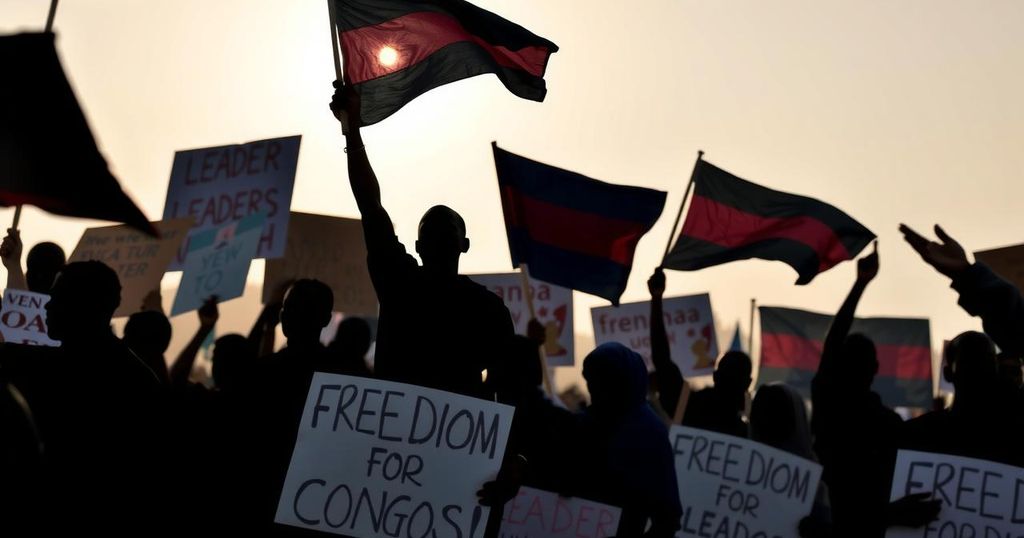Congo Protesters Demand Release of Political Prisoners Amid Growing Discontent
On September 25, 2024, hundreds protested in Kinshasa, Democratic Republic of the Congo, demanding the release of political prisoners, including three key opposition figures. The demonstration highlights ongoing discontent with President Felix Tshisekedi, whose administration faces criticism for politically motivated arrests and poor human rights practices. Protesters submitted demands to the minister of justice amidst a backdrop of calls for accountability involving the treatment of inmates in overcrowded prison conditions.
Protesters gathered in Kinshasa, the capital of the Democratic Republic of the Congo, on September 25, 2024, demanding the release of political prisoners, including three prominent opposition leaders currently incarcerated. The protesters, numbering in the hundreds, convened outside the highest court of the land, expressing their discontent over what they perceive as politically motivated charges against these opposition figures. Activists brandished banners with slogans such as “Release political prisoners,” while some vocally condemned President Felix Tshisekedi, alleging that he has devastated the country during his tenure. The demonstration followed a pattern of discontent towards President Tshisekedi, who was re-elected in December amidst allegations of electoral manipulation and a turbulent political backdrop. The opposition parties represented during the protest emphasized their view that political dissent is being systematically suppressed by the current government. Fiston Mayas, from the opposition party Together for the Republic, articulated the group’s frustrations, asserting the inconsistency of holding political prisoners in a nation purportedly governed by the rule of law. Among those highlighted by the protesters were Jean-Marc Kabund, Mike Mukebayi, and Seth Kikuni, who have been charged with various offenses, including accusations of undermining the state. Kabund and Mukebayi are currently incarcerated in Makala Central Prison, which is known for its overcrowding and deplorable conditions. Following a tragic incident earlier this month that resulted in a substantial loss of life during a jailbreak attempt, concerns for the well-being of inmates, especially political prisoners, have escalated. Kikuni was apprehended recently for alleged incitement, indicating a continuous trend of silencing opposition voices within the country. The timing of these protests coincides with the government’s announcement of its intent to seek a seat on the UN Human Rights Council, which has faced backlash from various civil society groups questioning the Congo’s suitability for such a role. These events underscore the persistent challenges within the DRC concerning political freedom and human rights, emphasizing a need for significant reform.
The Democratic Republic of the Congo has a long history of political instability and repression. President Felix Tshisekedi’s re-election has been mired in controversy, and his administration has faced accusations of politically motivated arrests aimed at quelling dissent. The opposition, which includes significant figures such as Jean-Marc Kabund, Mike Mukebayi, and Seth Kikuni, have been vocal about their belief in unjust imprisonments. Makala Central Prison is emblematic of the broader human rights issues facing the nation, with severe overcrowding and inadequate living conditions leading to tragic incidents. Furthermore, the Congolese government’s push for a seat on the UN Human Rights Council amid calls for political prisoner releases illustrates the complexities facing democracy and governance in the country.
The protests in Kinshasa reflect a growing frustration among Congolese citizens regarding the political landscape under President Tshisekedi. As opposition leaders remain imprisoned under contentious circumstances, activists continue to advocate for their release and decry the suppression of political dissent. The situation highlights significant human rights concerns, particularly regarding the treatment of political prisoners in overcrowded facilities. The upcoming bid for a position on the UN Human Rights Council by the Congolese government further complicates the narrative, as critics question the country’s commitment to upholding human rights standards.
Original Source: apnews.com




Post Comment